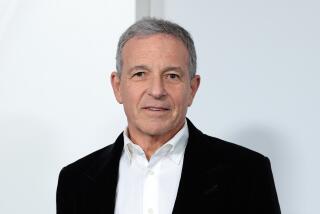Eisner Disputes MGM Charges Against Disney : Litigation: The chairman testified that, contrary to the plaintiff’s contentions, he always envisioned the Orlando, Fla., facility as a real studio.
Testifying as a defendant in a lawsuit accusing him and Walt Disney Co. of improperly using the name of a competitor at a Florida theme park and production facility, Disney Chairman Michael D. Eisner said Monday that he always intended for the facility to include a working studio.
To operate the Disney-MGM Studios in Orlando as anything but a studio producing genuine movie and television entertainment would court commercial disaster, Eisner testified in Los Angeles Superior Court.
“I think it would be a monumental failure,” Eisner said in his first appearance on the witness stand. “I think it would be a fraud. . . . I personally always felt you couldn’t fool the public. It had to be the real thing. . . . Without a working studio, I would not have approved it.”
MGM is seeking a court order halting Disney’s use of its name at the studio and damages in excess of $100 million in the trial, which has entered its second week.
Disney has filed a counter lawsuit, alleging that MGM studios and MGM Grand, both owned at the time by financier Kirk Kerkorian, conspired to breach the 1985 contract. Kerkorian, who sold MGM studios in 1989, is scheduled to testify later this week.
The thrust of Eisner’s testimony conflicted with the position of MGM: That Disney, after entering a contract in 1985 to license the name of MGM for the Orlando theme park, unilaterally and in breach of the contract began using part of the facility as a working studio.
Eisner, who is to resume testifying today, was self-deprecating but also unyielding during his 90 minutes of testimony. The Disney chairman at one point ridiculed a missive he composed in 1985 on the subject of the Orlando theme park as “a rambling, rather poorly written memo. Somewhat ignorant.”
But at another point, Eisner stiffened when Terry Christensen, an attorney for MGM, pressed to establish inconsistencies or other weaknesses in Disney’s position. After being examined at some length on whether a pavilion at neighboring Epcot Center was considered in 1985 to be separate and distinct from the envisioned working studio at Disney-MGM, Eisner said:
“I don’t want to argue with you. If you want me to say yes, I’ll say yes. If you want me to say no, I’ll say no.”
More to Read
The biggest entertainment stories
Get our big stories about Hollywood, film, television, music, arts, culture and more right in your inbox as soon as they publish.
You may occasionally receive promotional content from the Los Angeles Times.











